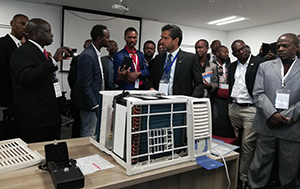UN Environment Pairs Officials Together to Improve Energy Efficiency, Protocol Compliance
From eSociety, June 2018
UN Environment is bringing together energy and ozone policy officials to educate them on energy efficiency and refrigerants.
As part of a UN Environment project under the Kigali Cooling Efficiency Programme (K-CEP), National Ozone Officers (NOOs) and National Energy Policymakers (NEPs) are “twinning” to jointly build each set of officials’ capacity to link energy efficiency with Montreal Protocol objectives in support of the Kigali Amendment.
Funding is provided by ClimateWorks Foundation, a non-governmental organization that collaborates with regional, research and foundation organizations to respond to climate change. ASHRAE is assisting in workshop presentation by describing the fundamentals of air conditioning technology and the relation of refrigerants to energy usage.
National Ozone Officers make up UN Environment National Ozone Units, which are government units in developing countries that manage programs to comply with the Montreal Protocol on Substances that Deplete the Ozone Layer including through compliance strategies, policies, among other duties. In the workshops, the NOOs are being paired with energy officials from the same respective countries.
In May, the ozone officers and energy policymakers met for a two-day “Twinning Workshop on Energy-Efficient Refrigeration and Air Conditioning” in Gaborone, Botswana.
Walid Chakroun, Ph.D., P.E., Fellow ASHRAE, from Kuwait; Bassam Elassaad, P.Eng, Life Member ASHRAE, from Canada; and Harshal Surange, Member ASHRAE, from India, were the ASHRAE members who supported the workshop’s participants by serving as subject matter experts.
 ASHRAE members supported the workshop’s participants by serving as
ASHRAE members supported the workshop’s participants by serving as
subject matter experts on energy efficiency, HVAC and refrigerants.
The workshop helped the officials explore opportunities to improve the performance of cooling products in their markets. The technical information connected how refrigerants, HVAC and energy efficiency work together.
Through presentations and a hands-on demonstration, ASHRAE members explained how HVAC works, how those systems are maintained and how refrigerants flow through HVAC systems.
Different sessions throughout the meeting included information on what countries have done to address the Montreal Protocol and Kigali Amendment through policies and data. Challenges looming ahead and how to face them were also topics of discussion.
ASHRAE members also participated in a twinning workshop held in Beijing, China, in April. Surange along with Don Brandt, Life Member ASHRAE, BEAP, from Arizona; Wayne Reedy, Fellow/Life Member ASHRAE, from Indiana; and Muhammad Idrus Alhamid, Ph.D., Member ASHRAE, from Indonesia, were the ASHRAE instructors for that workshop.
Future workshops are planned for Guatemala this month; Thailand in September; Turkey in October; and Ecuador in November.
The goal of the two-year twinning project is for the NOOs and the NEPs to develop their skills, share knowledge and ideas and improve cooling products’ energy efficiency during the refrigerant transition required under the Kigali Amendment, which enters into force on Jan. 1, 2019. The Kigali Amendment to the Montreal Protocol is meant to protect the climate by phasing down high global warming potential (GWP) hydrofluorocarbons (HFCs), which are commonly used as refrigerants.